The state law on the program to support families with two or more children came into effect in 2007. By providing a one-time state subsidy, it was supposed to increase the birth rate, thereby improving the demographic situation in the country and, as Dmitry Medvedev said, “saving Russia from extinction.”
Duration of the program
According to Law No. 256-FZ, adopted on December 29, 2006, the program is designed for a ten-year period - from January 1, 2007 to December 31. 2016 All families or single parents who during this time managed to give birth to or adopt a second and subsequent children, subject to a number of conditions, could and can still apply for a certificate for maternal capital, which will be canceled only starting in 2017.
However, this does not mean that it will be possible to use the required funds or pick up the certificate only before this deadline. If parents apply to the Pension Fund after January 1, 2017, the child’s date of birth will be taken into account. If it falls within the period specified by law, then there will simply be no grounds for refusing to issue the document.
There are a huge number of rumors and assumptions about when maternity capital will be abolished. Due to recent economic events taking place in the country, speculation about its cancellation in 2014 was quite popular this summer. Fortunately for the parents expecting a new baby, they were not confirmed and turned out to be just a newspaper duck. Despite a number of financial problems, the state does not relieve itself of its obligations and continues to make payments under the current program.
As for the abolition of maternity capital in 2015, there is no need to worry about this either. The proposals of the Ministry of Economic Development to save budget funds (up to 300 billion rubles per year) of the Russian Federation by closing the MK program, announced at the end of September 2014, did not find support in the Government of the Russian Federation, and payments to the budget for 2015-2017. have already been fully invested.
Changes in legislation
So, you shouldn’t expect premature cancellation of benefits. But whether the maternity capital program will be extended is a question that interests many. Discontent among the population caused by the proposal of the Ministry of Finance prompted a number of deputies to develop a new bill, according to which payments aimed at supporting families with children could be extended until 2025.
It must be said that based on the Concept of Demographic Development of the Russian Federation and on statistics on the use of MK funds, the bill may well be approved by the Government in the next two years - that is how long is left until the end of the first stage of the maternity capital program.

According to its authors, 2016 should be the next stage in the development of the program. In the near future, girls born in the 90s will enter childbearing age. The difficult social and economic situation characteristic of that period, as is known, led to a decrease in the birth rate, which means the number of potential mothers capable of giving birth in 2017-2025. not that big. It is obvious that the lack of guarantees and measures social support will worsen the demographic situation in the country and will once again lead to a decrease in the birth rate. Therefore, the abolition of maternity capital from 2016 is inevitable, but not so terrible.
President Vladimir Putin promised to “think” about extending the program, confirming during a direct line held on April 25, 2013 that in one form or another the fertility support program in the country will continue, but will become more targeted and targeted. What does it mean? There is a government project developed by the Ministry of Finance, which proposed limiting the current program and, starting in 2017, issuing certificates for state subsidies only to those families who really need them.
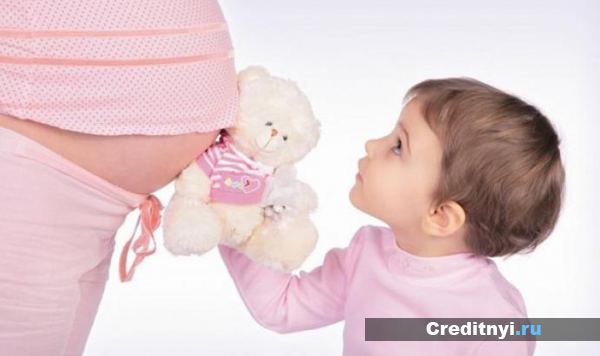
The degree of need will be determined by officials based on the financial well-being of the family. Those for whom the birth of a second, third... fifth child, in their opinion, will not be burdensome, will no longer be able to count on government assistance measures. But for families with low and middle incomes, support from the state will be very helpful. Financial experts have already commented on the proposal. They believe that such an “individual” approach will lead to the concealment of income by the economically active part of the population and will not the best way solving the problem.
Will there be a sequel?
Today we can only guess when the maternity capital program will end and until what time officials will decide on the adoption of a new bill. In any case, in 2016, maternity capital in the form in which it exists now will be abolished. There is a possibility that the next phase of the program will come into force.
In the latest news, there are also opinions that talk about ending maternity capital is just a political move. By voicing the terrible figures that MK funds are taken from the federal budget, the Ministry of Finance may be escalating the situation so that at the end of 2016 the president will happily announce that there is money and the program to help families with children will continue.
Let's hope that's the case. And it doesn’t matter until what year the parents get their long-awaited baby, because financial assistance from the state will be a significant help for many in improving their living conditions or a number of other problems.
Currently, families with a second and subsequent children are paid maternity capital. Duration of the program family support ends on December 31, 2016. However, there are now proposals to extend this period until December 31, 2025.
The law on a new form of state support for families with children - maternal family capital - came into force on January 1, 2007. You can receive maternity capital (MC) only once, that is, if you have already received a payment for your second child, then you cannot receive it at the birth of your third child.
The right to receive payment is confirmed by a state certificate for maternal capital, which is issued by the department Pension Fund Russia (PFR). At the same time, the law does not limit the period during which you can contact the Pension Fund of Russia with an application for the issuance of a certificate. For example, if your second child was born in 2012, then you can apply to the Pension Fund for payment ten years later. All this time, your family capital will be kept in the Pension Fund and will increase annually by several percent ().
The current one (Part 1 of Article 13) establishes that for maternity capital the duration of the program is limited to a period of up to December 31, 2016. Thus, if the program is not extended and it is cancelled, then MK will not be paid for the birth of children after January 1, 2017.
Possibility of extension
In April 2012, parliamentary hearings on the use of maternity capital were held in the Russian State Duma. The hearing participants recommended that the Russian government extend the program until 2025.
Earlier, President Dmitry Medvedev also spoke about a possible extension of the deadline: “The program can be extended, we’ll wait and see. But all obligations generated by this program will continue until final implementation, so that no one will have doubts.” On the other hand, Prime Minister Vladimir Putin clarified that sooner or later the program will “end.” In this regard, he urged women to “hurry” to have a second child.
Due to the financial crisis in 2015, the extension of the program remains in doubt. Although representatives of the government’s social block insist on its continuation after 2016.
Currently, more than 4 million families have received a certificate for MK. “Mother’s money” is mainly spent on improving the family’s living conditions by repaying housing loans. In particular, MK is used as payment of mortgage debt or as a down payment on a loan.
The term “maternity capital” first appeared in 2006. Maternal (family) capital is a measure of state support for Russian families in which, from 2007 to 2018 inclusive, a second child was born (or adopted) (or a third child or subsequent children, if at the birth (adoption) of the second child the right to receive these funds is not was issued).
Basic provisions on maternity capital
The right to receive maternal (family) capital is granted to a family once. Maternity capital is subject to indexation and changes in its size do not provide for the replacement of a certificate document. The period for filing an application for maternity capital after the birth (adoption) of a second (third or subsequent child) is not limited.
An application for disposal of maternity capital funds is submitted at any time after three years from the date of birth (adoption) of the second (third or subsequent) child. If it is necessary to use maternity capital funds to pay the down payment on a housing loan or loan, as well as to pay the principal and interest on a loan (loan) for the purchase or construction of housing or for the purchase of goods and services for the social adaptation and integration of a disabled child into society (disabled children), the capital can be used at any time after the birth or adoption of a child, with whose birth (adoption) the right to receive a certificate arose. Maternity capital is exempt from personal income tax. The certificate is valid only upon presentation of an identification document. The validity of the certificate is terminated in the event of the death of the owner, deprivation of his parental rights in relation to a child, in connection with whose birth or adoption the right to receive maternity capital arose, or the commission of a deliberate crime against his child (children), related to crimes against the person, as well as in case of cancellation of the adoption of a child, in connection with whose adoption the right to maternity capital arose, or in connection with the use of maternal (family) capital funds in full. If you lose your certificate, you can get a duplicate. Maternity capital funds can only be received by bank transfer. Any schemes for cashing out these funds are illegal. At the same time, the owner of a certificate for maternity capital, who agrees to take part in cash-out schemes, commits an illegal act and can be recognized as an accomplice to a crime based on the misuse of public funds.
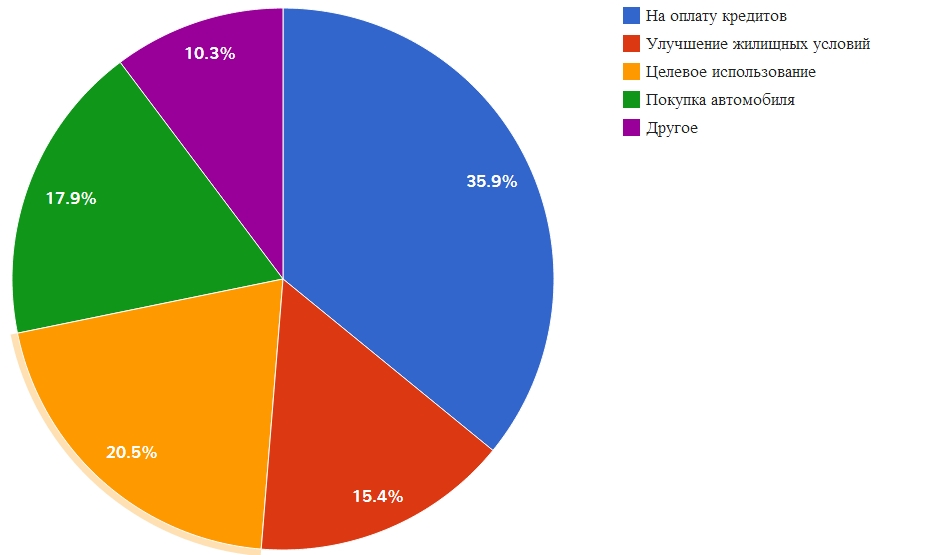
What role does the Maternity Capital program play for our country and for its citizens?
The idea of implementing state support for fertility in Russian families was directly dictated by the acute situation with the demographic decline observed in the early 2000s. There is an urgent need for financial support for young families.
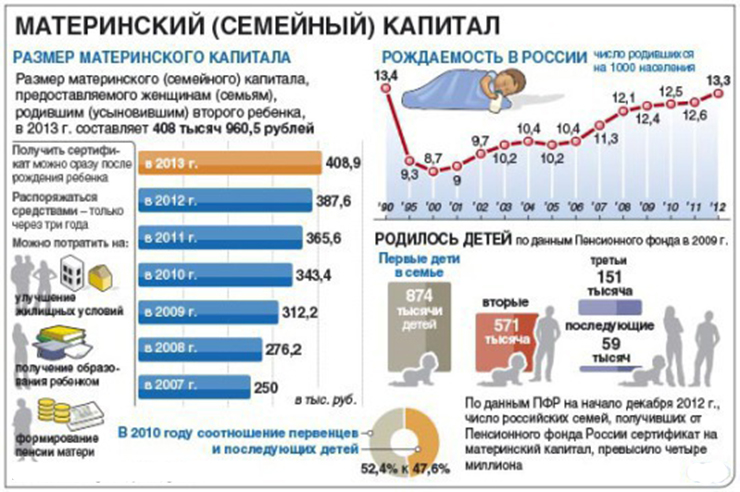
After all, the population census conducted in 2002 revealed alarming indicators that began to directly affect the security of our country. We are talking about the dangerous demographic situation that developed at that time: about 15% of all Russian families at that time had two minor children, and only about 3% had three or more children. Half of all Russian families were childless. In addition, the number of single-parent families increased every year. A national-scale project called “Maternity Capital” was developed based on the threat of a demographic catastrophe. For a number of reasons, young parents did not want to have children and were often limited to just one child in the family. While mortality/fertility statistics forced the authorities to take urgent decisions to strengthen the prestige of the family institution, and at the same time encourage parents to have as many children as possible. The entire history of the implementation of the Maternity Capital program indicates its importance for the population of our country. After all, it was initially planned that the program would end its purpose on December 31, 2016. And that in 10 years the state will be able to improve the demographic situation and complete the financing of maternity capital certificates.
Families received the opportunity for additional funding from the state, and this, to a certain extent, became an incentive for the birth rate and strengthening the institution of the family.
By 2015, statisticians recorded a significant increase in population, and a significant role in this process is undoubtedly assigned to the “Maternity Capital” program.
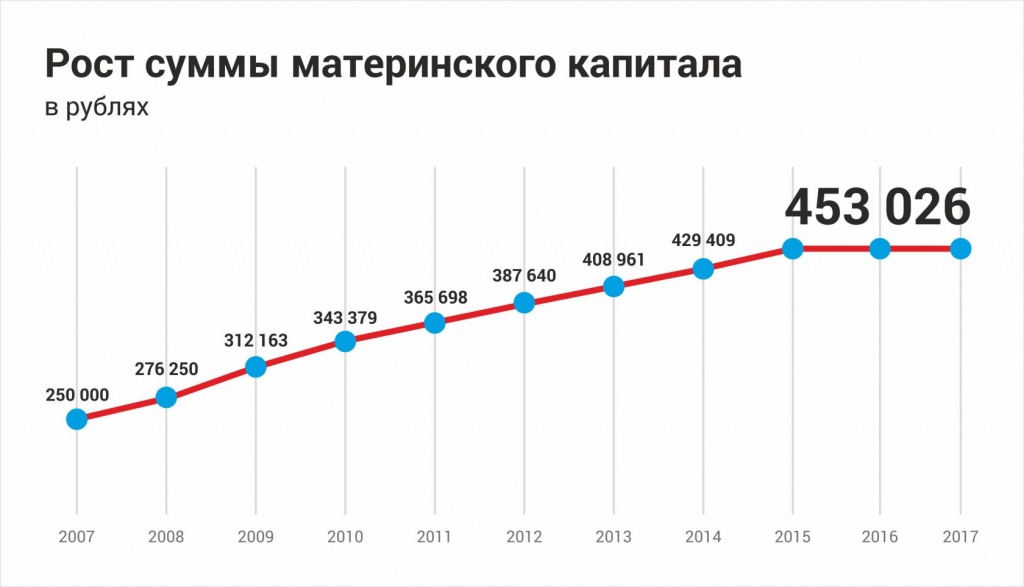
Families with children began to look to the future more confidently. The state launched a mechanism that provided a set of measures for administrative, social and financial support for the family. The state certificate for maternity capital has become a personal document intended primarily for Russian mothers. Its amount gradually increased and by 2015 it reached 453,026 rubles.
Many families positively perceived government assistance in the form of budget financing for the targeted use of the maternity capital certificate, and this actually served as an incentive to have a second and subsequent children. Thanks to maternal capital, many families managed to improve their housing situation, use funds allocated by the state to purchase housing, build a house, mortgage, and reconstruct existing housing. In addition, maternity capital has become a help for other equally important investments permitted by law. Now every Russian family knows that “Maternity capital”, as a form of state support, exists for those families who, in the period from 2007 to 2018 inclusive, had a family addition (a second child was born or adopted).
Where can these funds be spent?
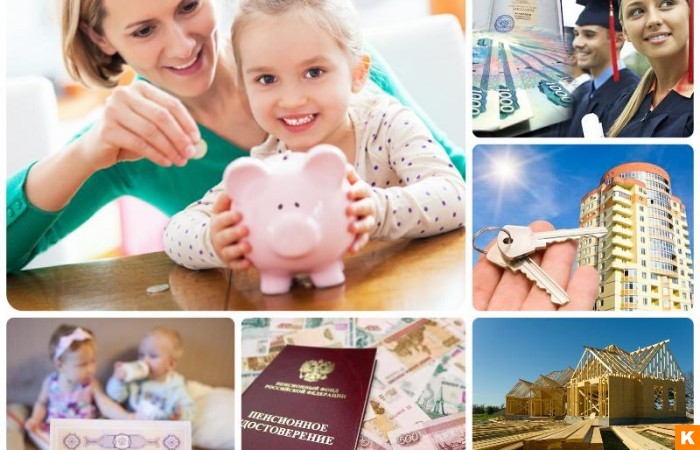
This is, first of all, improvement of living conditions, repayment of a mortgage loan, reconstruction and repair of a residential building with an increase in living space, compensation for building a house, repairing and building a house on one’s own, shared construction, participation in housing construction cooperatives, obtaining an education, student accommodation in hostel educational institution, payment for the services of an educational institution, payment for the maintenance of a child in kindergarten. We covered these goals in detail in our “Legal Advice” section.

Registration of maternity capital
The procedure for processing documents for maternity capital is discussed in detail in our publications, but in short, it includes the following main steps:
- Application to the Pension Fund (at the place of residence, at the place of actual stay).
- Waiting for a decision from the Pension Fund within a month.
- Obtaining a state certificate.
Who can receive maternity capital?
We also covered this issue in our articles. We told you that Federal Law No. 256-FZ in Article 3 defined the categories of citizens who can receive a certificate. These include the following citizens Russian Federation: women at the birth or adoption during the period from 01/01/2007 to 12/31/2018 of a second child (third, fourth and further), men who adopted a second child (third or subsequent children) from 01/01/2007 to 12/31/2018, adoptive parents children (if the above woman is deprived of the right to maternity capital (in case of death, disappearance, deprivation of parental rights, commission of a crime against children), the child himself is under 18 years of age (up to 23 years of age if he is a full-time student at a university) in cases when parents have died, are declared dead, have been deprived of parental rights, or have committed a crime against their children.

Until what year is maternity capital valid?
In 2015, alarming news began to arrive that the Maternity Capital program might be closed. However, in December 2015, speaking with his annual message to the Federal Assembly, Russian President Vladimir Putin instructed the Government of the Russian Federation to extend the maternity capital program for another 2 years - until December 31, 2018. And so, by Federal Law of December 30, 2015 No. 433-FZ the extension of the program was enshrined in law. According to the amendments and additions made to Federal Law No. 256-FZ of December 29, 2006 “On additional measures of state support for families with children,” the program validity period extends from January 1, 2007 to December 31, 2018. This is expressly stated in Article 13 of this law.
Answering the question until what time the Maternity Capital program is running today, we can confidently state the fact that this program is valid until 2019 and until this moment it is unlikely to be terminated ahead of schedule. At least the state has taken on such obligations.

On the shortcomings of the implementation of the Maternity Capital program
Despite all the positive aspects, the idea of solving the demographic problem in the country through maternal capital was a great breakthrough and hope for the majority of citizens of modern Russia. But during the implementation of this program, a number of shortcomings and serious shortcomings were identified both in the program as a whole and in the idea itself.
Firstly, we are faced with a situation where, no matter how many children a Russian family gives birth to in its entire life, it will receive a certificate for receiving maternity capital only once.
Secondly, the corresponding indexation of the program always lags behind the level of inflation. (The cost of food and goods is outpacing the official inflation rate).
Thirdly, for large cities, especially for megacities, the amount of maternity capital is clearly not enough to solve the housing problem. It is more realistic to purchase real estate with a mortgage, and this amount will be used for the down payment or to pay off interest. However, directing maternity capital to purchase housing is the most popular option for using the certificate. (Over the 10 years of the program, more than 4 million families have already used money provided by the state to purchase residential premises).
Until what year can I receive a maternity capital certificate for my second child?

According to the above-mentioned Article 13 of the Federal Law, the second child who appeared in the family before December 31, 2018 is entitled to maternity capital. Prolongation state program discussed in the Government and in particular in the Ministry of Labor and social protection, and, according to some information, there is a proposal to extend the maternity capital program from January 2019 for 5 years, that is, until December 31, 2023. But for this, the federal budget must be able to cope with payments to families with children.
When does the deadline for receiving a maternity capital certificate expire?
Article 5 of the Federal Law states that a person who has the right to register maternity capital can apply to the Pension Fund (PFR) or a multifunctional center (MFC) for a certificate at any time after the corresponding right appears - that is, the deadline for receiving a certificate for maternity capital capital is not actually spelled out in law.
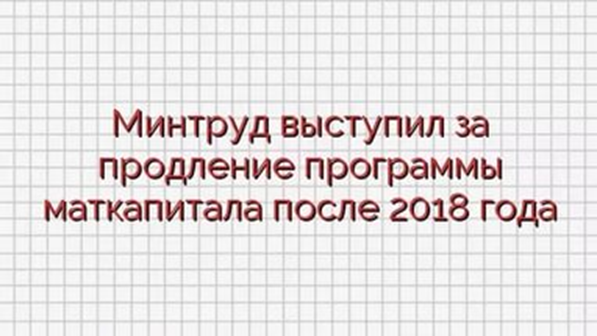
This means that if the maternity capital program itself can end on the last day of December 2018, then the right to sell maternity capital funds will not thereby cease. For families whose second child is born before December 31 of the following year, the program will continue, and they have the right to apply for a certificate after December 31, 2018. Even after a few years, such families will be able to exercise their legal right to use the certificate for its intended purpose.
Until what year will maternity capital payments be paid?
It is important to say that the Federal Law, which regulates the grounds and procedure for obtaining maternity capital, does not establish a limitation on the period of use of maternity capital funds. Article 7 of the law states that you can apply for disposal of funds at any time - the main thing is that the child is already 3 years old. A mortgage can be taken out or repaid using maternity capital without this age limit, that is, without waiting for three years.
At the same time, the final date for the period of use of finances under the maternal certificate has not been established. For example, Article 11 of this law states that maternity capital can be used to pay for the education of children until they reach the age of 25.
And if maternity capital is used to accumulate a pension, then maternity capital funds can be used in this case when the mother reaches retirement age.
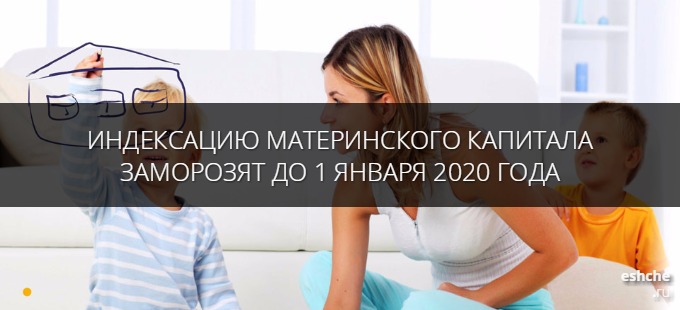
Freezing maternity capital until 2020
According to Article 12 of Federal Law No. 444-FZ of December 19, 2016, a decision was made to “freeze” maternity capital until 2020. This means that until the end of the specified period, maternity capital, as well as its unspent balance, will not be indexed. The use of this measure is due to the difficult economic situation in the country and is aimed at reducing costs. Thus, maternity capital funds were last indexed in 2015 by 5.5%. Its cost did not change in 2016 and 2017 and amounted to 453,026 rubles.
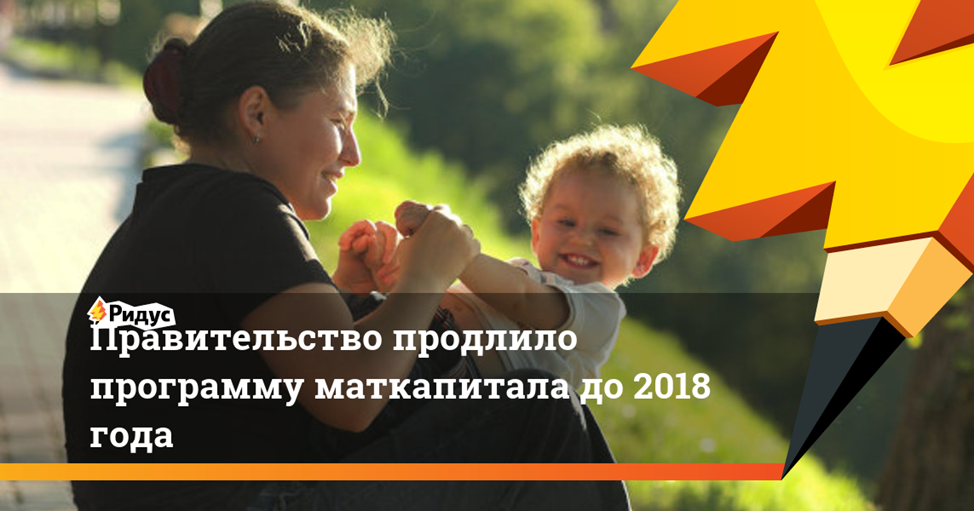
New legislative initiatives on maternity capital in 2017
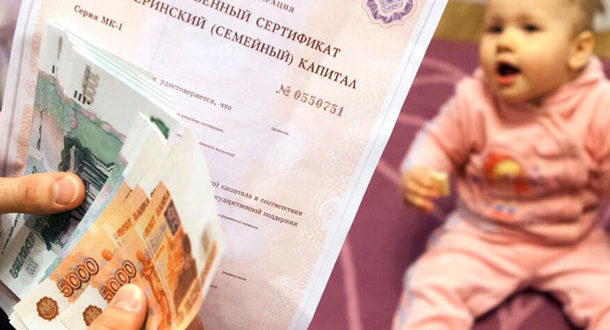
A draft law is under discussion in the State Duma, which proposes an extension of the maternity capital program for a period of 10 years with changes in a number of conditions for its issuance and the purposes of its direction. The bill provides for a change in the social group that can claim maternity capital - deputies proposed issuing it only to parents with many children who gave birth to or adopted a 3rd child in the period from 01/01/2017 to 12/31/2026. It also provides for a significant (more than doubling) increase in the amount of maternity capital. At the same time, its use is intended to improve living conditions. There is also an initiative that is proposed not as an amendment to an existing law, but as a completely new law.
According to many politicians governmental support for families who have decided to have a third child, this is very necessary and justified.
Despite numerous criticisms of the program Russian families I want to be sure that when they have a second child, starting from January 1, 2019, the state will not leave them without maternity capital, which has already become commonplace over 10 years. Despite the restrictions on spending funds, this money turned out to be a significant support for many families.
Now it is possible to provide the following possible options further fate of the maternity capital program:
- its extension under current conditions - for 5, 10 or another number of years by amending the terms of the program in the existing law;
- a significant change in the program from 2019, taking into account budget capabilities, including the use of targeting and need criteria;
- completion of maternity capital after 2018, as originally provided for by law dated December 29, 2006 No. 256-FZ for families in which the second child and subsequent ones will appear after January 1, 2017.
Maternity capital helps solve the problem of fertility and supports the well-being of families with children. It is not yet known which of the listed options will be implemented after the end of the maternity capital program in December 2018.
But today's families planning to increase their family should hurry up in any case in order to obtain the right to a certificate.



